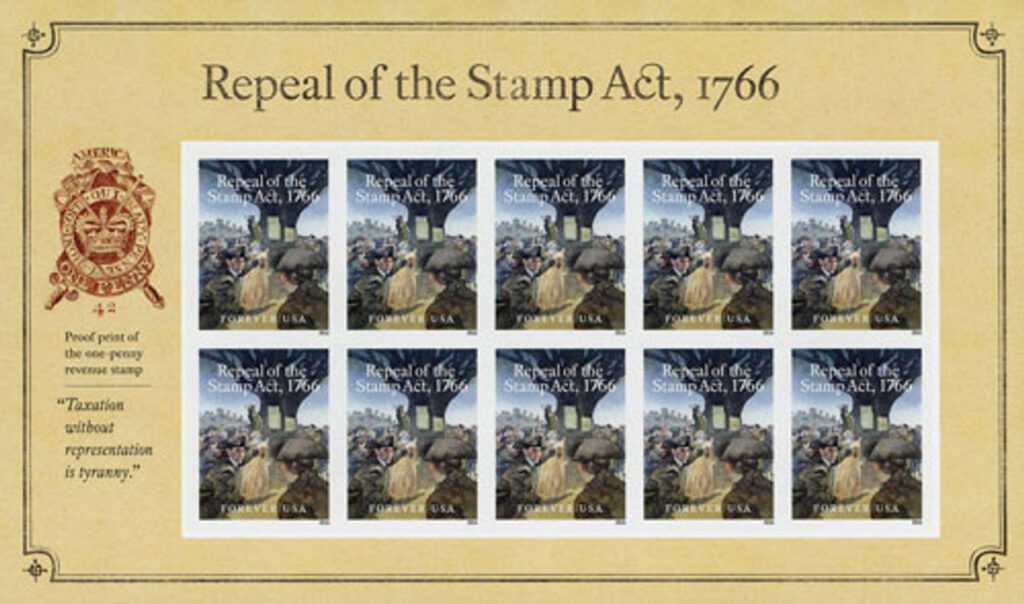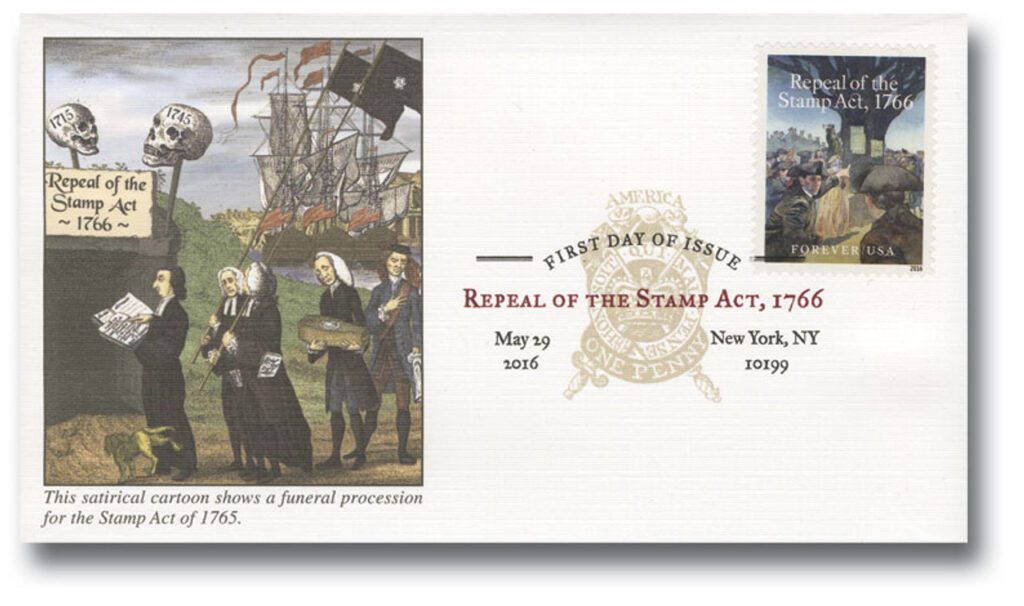On March 18, 1766, British Parliament repealed the Stamp Act.
Britain first passed the Stamp Act on March 22, 1765, in an attempt to increase its revenues from the American colonies to help cover the debts incurred during the French and Indian War. This act placed a direct tax on the colonies for the first time. It forced colonists to buy a British tax stamp for every official document they obtained.
Under this act, all types of printed material required a stamp showing that a tax had been paid. Items requiring these stamps included newspapers, books, court documents, land deeds, almanacs, and playing cards.
Colonists were outraged and protested against taxation by Parliament, because they had no one to represent them. In response British goods were boycotted, customhouses were vandalized, and tax collectors were attacked. In England, merchants whose products were boycotted pressured Parliament to repeal the act.
The “Sons of Liberty” secret society was formed within the 13 colonies to coordinate protests. Effigies were burned under the “Liberty Tree” in Boston, and fear kept many tax distributors from selling the stamps.
That June, the Massachusetts Assembly sent a letter to the various colonies (including portions of present-day Canada and the British West Indies) to arrange a meeting to discuss the situation. Nine colonies (Massachusetts, Rhode Island, Connecticut, New York, New Jersey, Pennsylvania, Delaware, Maryland, and South Carolina) ultimately selected delegates to attend the congress. Among the delegates were some familiar names: Robert R. Livingston and Caesar Rodney.
The delegates met in New York City in the fall of 1765 behind closed doors. They debated the differences between direct internal taxation and external taxation from Britain. In the end, they largely agreed that taxation should remain within the colonies.

The delegates produced a statement of rights to send to the king and Parliament, known as the Declaration of Rights and Grievances. Many in England refused to recognize the document and considered it inappropriate and unconstitutional. However, the threat of lost trade led some to rally for the repeal of the act.
British Parliament ultimately voted 276-168 to repeal the Stamp Act on March 18, 1766. But they also passed the Declaratory Act, which claimed its authority to legislate the colonies no matter what. The decision slowed calls for independence, though it did not stop the march toward the American Revolution. The die had been cast. Flush with victory, colonists would soon use their Stamp Act protest tactics to push for true independence.
| FREE printable This Day in History album pages Download a PDF of today’s article. Get a binder or other supplies to create your This Day in History album. |
Discover what else happened on This Day in History.





Down with the Tyranny’s!
I really appreciate these articles of history and they refresh my memory of what I learned in school, many “moons “ ago. Thanks again!
Wish they would start teaching history in schools again, if not the parents of today’s children need to keep the history going.
I’m not sure just what you mean, Bob. History is taught in the schools. I taught history in high school and community college for 38 years. My wife taught third grade for 25 years, and history was and is part of the elementary school curriculum.
Right on!
There are rumblings of history being altered in some states with Texas leading the way. I hope that is not true. Thank you Mystic Stamps for the history I learn from your stamps and articles. So there Texas!
You are right, Dorothy. Some states such as Texas, Mississippi, Florida, Virginia and others are passing laws to make it difficult to teach about and ban books about slavery and racism such as during the Jim Crow era. The backers of these laws say that they don’t want the white kids to feel bad. Oh, come on, we need to be honest about our past both the positive and the negative. The kids can take it; it’s some of the adults that have a problem.